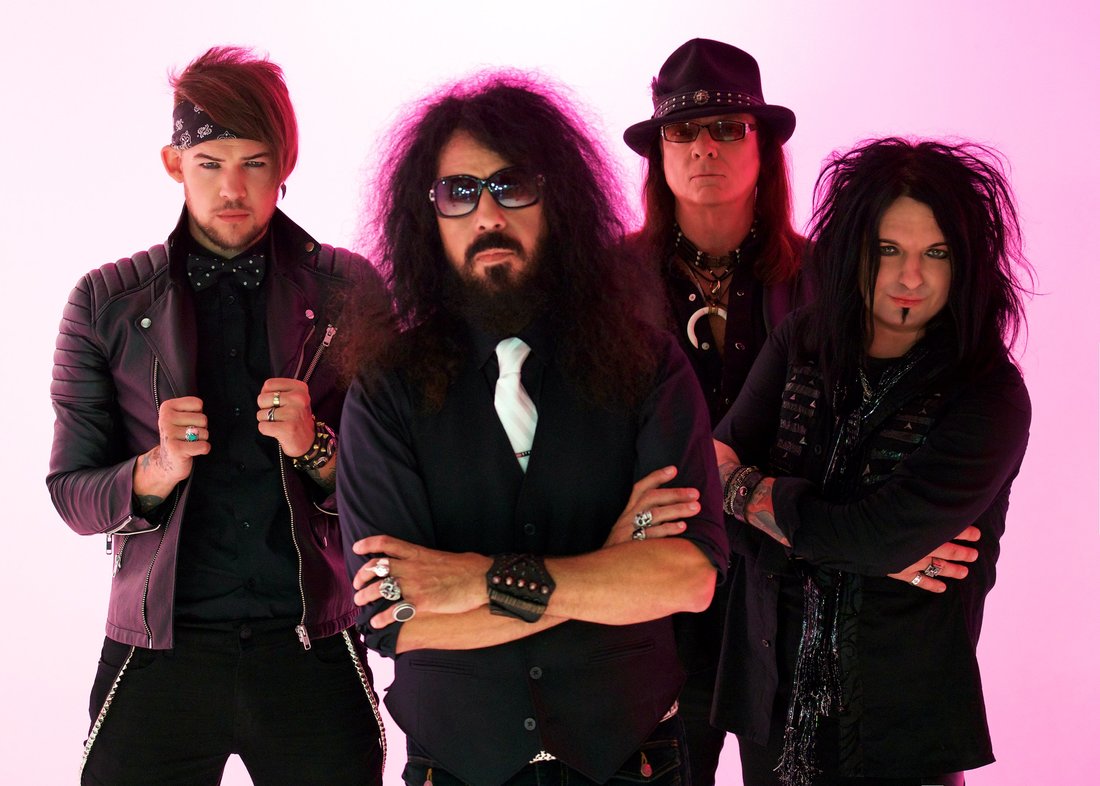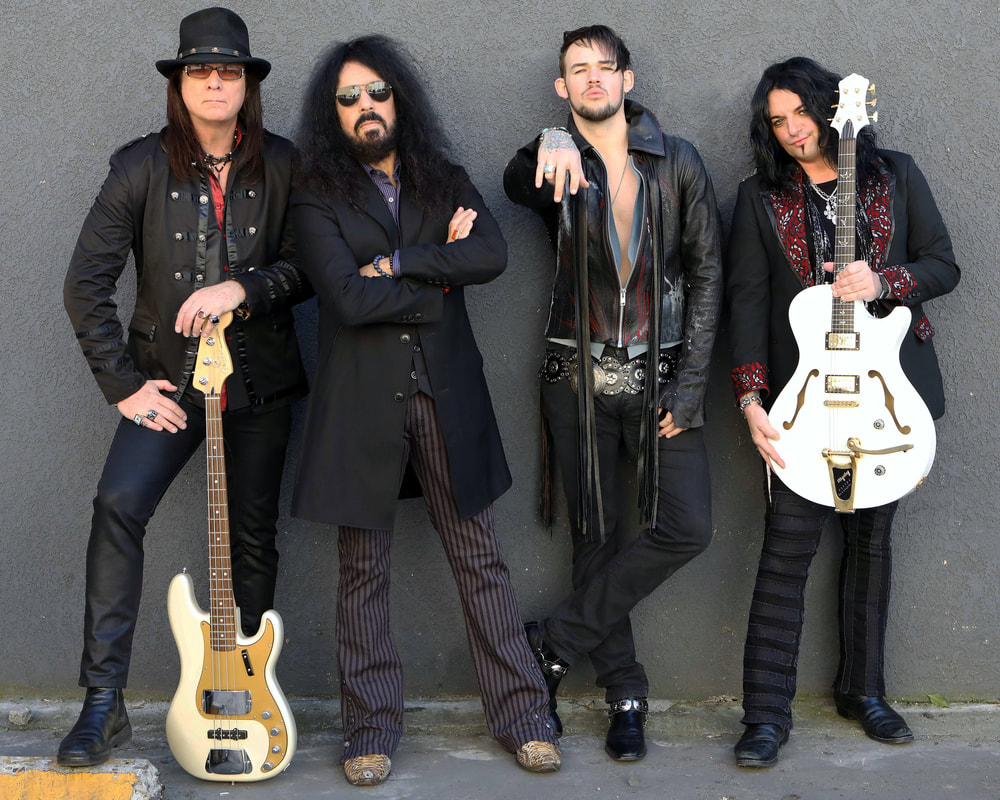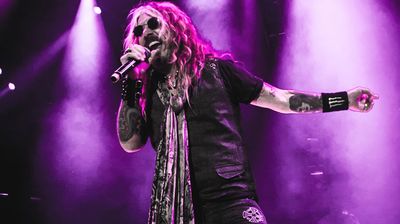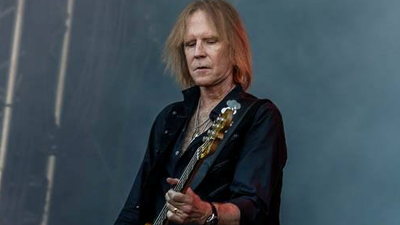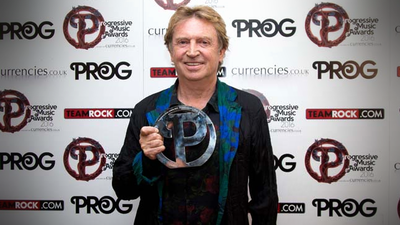|
Quiet Riot drummer and band leader Frankie Banali has seen and done it all during his four decades in music. From reaching the top and selling over six million albums with QR’s infamous ‘Metal Health’ album, to enduring the sad death of vocalist Kevin DuBrow, the sometime W.A.S.P. player has weathered the storm. Back with a new line-up, and their first album of all-new material in over a decade, we caught up with Frankie to discuss the road to ‘Road Rage’ and his storied career. Condition Critical; Eamon O’Neill.
How are you today Frankie?
I’m doing great. It’s a beautiful day out, and I’m just taking care of Quiet Riot business. Everything is really well right now for the band and myself. You’re gearing up for the release of Quiet Riot’s ‘Road Rage’ album; you must be excited to finally get it out? I am, and especially when you consider that the last official record that Quiet Riot did was with the late, great Kevin DuBrow in 2006. That was ‘Rehab’, so this is actually the first official release that we’re doing in eleven years. ‘Road Rage’ went through a rather difficult gestation period. Well you know, there’s a lot of things that led to the factor of ‘now is the right time to release the record’, because from the time I decided to resuscitate this thing called Quiet Riot back in 2010, there’ve been a lot of obstacles and hurdles that I’ve had to jump through in order to get Quiet Riot to a place where it was worth recording and releasing new product. It must have been a difficult decision to make to part ways with singer Shaun Nichols as the album was about to be released. Well, ultimately, it wasn’t a difficult decision to make; ultimately, it was the right decision to make, because after only five live performances with Mr. Nichols, it became very apparent – to not just me, but the entire band – that it simply was not going to work, on so many levels. I think anybody else would have probably released the record as it was, but I’m the type of personality that if I don’t feel it’s the right thing to do, if there’s any way that I can remedy the situation, then it’s exactly what I will do, and always have done. Most people would have just let the sleeping dog lie, but I decided to wake him up and ask him to leave. You’ve been through a few bumps with singers before, as seen in the 2015 documentary ‘Well Now You're Here, There's No Way Back...’. Everything in this business is trial and error; some things come easy, some things don’t. I’m very, very resilient, so if something is not working, we’ll do everything to make it work; I won’t just sit there and not have it as good as it could be. At some point, one of the errors that I made was that I wanted to invite the underdog; somebody that maybe had the talent, but for whatever reason did not make it, and then I come to find out that sometimes it’s not because they’re an underdog, sometimes it’s because there were other factors that make it impossible for a person to make something work. So the underdog situation certainly did not work. How did new singer James Durbin come into the picture; wasn’t he the ‘metal’ guy from American Idol?
That is correct. I didn’t watch the American Idol show very often, but somebody told me that there was a guy that was supposed to be the ‘rock’ guy or the ‘metal’ guy, and I saw him singing with Judas Priest, and I saw him with Zakk Wylde, and I thought to myself; “That guy’s really talented” – and that was it – out of sight, out of mind. What happened is, after I signed the deal with Frontiers Records and I found myself in need of a new vocalist for Quiet Riot, the first person I thought of was James. So, I reached out, and he was really into doing it, but the problem was that he had just finished signing a contract to do a series of dates in Las Vegas and it was open-ended, so there was no way that he could commit, and there was no way that I could wait for him. So then I reached out to my second choice, and that individual had recently gotten married and decided he didn’t want to go out on the road anymore, so that made it impossible to go with choice number two, and ultimately I went with choice number three, and you know the rest of the story. You’ve released two tracks from the album so far; the moody ‘Freak Flag’, and the hard-driving ‘Wasted’; do these paint a picture of the album as a whole? No. I didn’t try to write a thematic record, and I didn’t create a certain type of record; my only criteria was I wanted it to be a solid 'rock' record. ‘Freak Flag’ and ‘Wasted’ are two songs that I think the long-time fans of Quiet Riot will connect to, and they’ll find some similarities to some of the material from Quiet Riot’s past. When you get to some of the other songs like ‘Getaway’ and ‘Rule This Joint’, and ‘Still Wild’ and ‘Knock ‘Em Down’, in my opinion, they’re all solid rock tracks, and if you’re a fan of Aerosmith you may like something on ‘Road Rage’, if you’re a fan of Led Zeppelin, you’ll find something that you’ll like on ‘Road Rage’ as well. So I’m very happy with the way the record turned out. How did the writing and recording process work? All the music itself, the majority of it was written by myself and my writing partner Neil Citron, and also with [guitarist] Alex Grossi and [bassist] Chuck Wright. All that music was written in-house before anything happened, so when I needed to get in touch with James and he was now available and really happy about coming on board with Quiet Riot, I sent him just the music tracks. He had never heard the other versions, so I just gave him, essentially a blank canvas where he could add his all totally new lyrics and melodies. A couple of songs are completely brand new, so it’s a very different record than, shall we say ‘mark one’. Going back through Quiet Riot history, and what was it like to be the first metal act to achieve a number one album on the Billboard chart back in 1983?
It was interesting, because when we recorded the ‘Metal Health’ record in ’82, we all thought in the band that it was a great record, but we weren’t exactly sure whether anybody else was going to agree with us, because there was nothing like ‘Metal Health’ on the charts at the time. We had the challenge of jumping over Michael Jackson’s ‘Thriller’, and The Police’s ‘Syncronicity’, and all the people who were at the top of the charts at that point, like Lionel Richie, Paul McCartney, and Linda Ronstadt who were mainstream rock or very much established bands. So when we made it to No, 1, it was probably more of a surprise to us than it was to anybody else. But it was a wonderful ride. We found out when we were opening up for Black Sabbath on the ‘Born Again’ tour. The 2015 documentary that we touched on revealed a great love within the band, particularly between yourself and Kevin. I always tell people that the person responsible for making the documentary was [producer] Regina Russell, because I am responsible only for having lived it. I think for the casual observer, or even a diehard fan, their idea of what it’s like to be in a band is that you take a Limo to the airport to go play a big show, you take the Limo back to the hotel, you have a party, and repeat. But the reality of the situation is quite different; it’s like a family, and like all families, there are great times and there are bad times. I had a wonderful relationship with Kevin for nearly three decades, and it’s not to say that we got along always, because no one gets along always, but we always managed to repair the strained bits and continue our friendship. There were quite a few members that went through the band. A lot of people don’t realise that Quiet Riot had more different members come in and out of the band than anyone would have imagined. Everybody kind of sees the band as the classic ‘Metal Health’ line-up, but the reality is that that line-up only stayed that way for two records, and it continued to change year in, and year out. The ‘Terrified’ album recently celebrated its 24th anniversary; what are your memories from that period? When you release an album on an independent label, everybody always views it as a step down, but I think the record is one of the better Quiet Riot records, post-the ‘Metal Health’ era. It just wasn’t given the attention because it didn’t get a lot of promotion or publicity. But the important thing for me was that was the first time that Kevin and I had spoken again, and he asked me if I would be interested in doing it again. He asked me three of four times if I would do it, and I finally decided to do it with some conditions. So, it’s significant for that, and it’s also significant for me because when we started working together the band asked me to manage the band, and I’ve been managing the band ever since. So it’s actually, it’s a monumental release, personally, for you? Yes, personally, and from a musical point of view, and from a business point of view. There were a lot of changes, because I’m a very work-oriented person, and I’m a very focused person, so as soon as they asked me to take over the management of the band, how we did things immediately changed, and we were fortunate enough that with that kind of work ethic; we were able to continue during a period of time when most people – especially in America – were not interested in this genre of music. Prior to that period, you worked with W.A.S.P. How did you come to work with the band on ‘The Headless Children’?
I had known Blackie [Lawless, W.A.S.P. band leader] for a number of years before I did ‘The Headless Children’ record, and what happened is when he was in the process of editing and mixing the live record [‘Live… In The Raw’], he asked me if I would be interesting in joining the band and doing the next record. At the time, I still owed CBS records a Quiet Riot album, so I was in the studio recording the forth record [1988’s ‘QR’] with the version of Quiet Riot that had Paul Shortino singing, so I said to Blackie that there was no way that I was going to be able to tour, but if he did not find a permanent replacement and needed somebody to do the record, that I was more than willing, and happy to do it. What are your memories of recording ‘The Headless Children’? I literally was recording the forth Quiet Riot record and ‘The Headless Children’ at the same time. I would be at one studio for Quiet Riot during the day, and in another studio in the evenings with W.A.S.P., and sometimes vice-versa. It was a great experience. To me, out of all the W.A.S.P. records, that record was significant, as it had substance; in that it no longer focused on the raw meat [act], and the factor of the creepiest image of the records that W.A.S.P. released up to that point. It was the first record that W.A.S.P. did where Blackie was really thinking about the subject matter when he was writing. I’ve played on seven of the W.A.S.P. records, and hands down, for me, my favourite record – and I like them all - is without a doubt ‘The Headless Children’. I’m proud to say that it received a silver and gold award in the UK, and I have it sitting here in my office. There’s a monster drum sound on ‘The Headless Children’. It was the first record that I did with Blackie, and I was allowed to bring in my own drums into the studio, so that has a lot to do with it. If you listen to the W.A.S.P. albums previous to ‘The Headless Children’, if you listen to the drums and then you listen to the drum sound on ‘The Headless Children’, it’s a completely and totally different album, and that has a lot to do with the drums I used, the way I tune, and the way I hit. But yeah, I’m really, really proud of that record. How did you go from the end of Quiet Riot to becoming a member of W.A.S.P.? It’s so weird how things happen, because as the version of Quiet Riot that released the ‘QR’ record, things were not going well at that point, and it was just falling apart, and I had made the conscious decision that after we did out last show in Tokyo at the Sun Plaza, that I was going to put the Quiet Riot band on the back burner and really take a hiatus from it. Blackie somehow found out that that’s what I was planning on doing, and he called me up and said; “Listen, I want you to stay in Tokyo and do press for ‘The Headless Children’, and then I want you to meet me and the rest of the band in the UK the following week and we’ll do pre-productions for the tour”. So I found myself flying from Tokyo to London, and I was on tour with W.A.S.P. for a solid year. All that you missed out on was the photo shoot for the album sleeve. That was actually intentional. I was still under contract to CBS, and the parameters of my contract was that while I could appear on someone else’s record and I could be credited as being a performer, my photograph could not be used. As it turned out, Blackie went ahead and used my picture anyway on the tour book, and he used it, I think, on a single! You also played drums on W.A.S.P.’s ‘The Crimson Idol’, which was a very different release, much closer to a solo Blackie Lawless album.
Well, to all intents and purposes, it was a solo record in that the biggest difference between the way that we recorded ‘The Headless Children’ - which was recorded as a band - and the way we recorded ‘The Crimson Idol’ was there were only three people initially in the studio. It was myself, Blackie, and the engineer. What Blackie had done, he had recorded scratch tracks of each of the songs – nothing too in-depth, but that is what I played to. That record took a year to make. I was in the studio for a year, five days a week, with Blackie, working on that record, but I never played with any other musician for that solid year. So from that regard, you’re absolutely correct, it is more of; rather than saying it’s a Blackie solo record, I would prefer to say that it was Blackie’s vision completely top to bottom, with no outside opinions or interference. Would it interest you to play with W.A.S.P. at the 25th Anniversary ‘Crimson Idol’ shows that they’re planning? I don’t think so. I think that twenty-five years down the line, we have different interests, we have different focus, we have different ways of doing things, and I think that Blackie should continue doing things the Blackie way, and I will continue doing things the Quiet Riot Way. I wouldn’t mind jumping up on stage and playing a song, but I think things are the way they are because they are the way they should be. Getting back to Quiet Riot, and you must be excited to get back on the road in support of ‘Road Rage’? Well, we’ve been out touring, and it was a seamless change from the previous singer to adding James. We have been on tour since January of this year, and we’re actually booked right now into February of 2018. We’ve already added ‘Freak Flag’ to the set, and we plan to add another track within the next two weeks to the live set. It’s very exciting for me, personally, after so many years to first of all; have a new Quiet Riot record coming out, and also performing new music from that record, which I think fits within the existing Quiet Riot material that we play nightly. Have you any plans to bring the band over to Europe? I would love to, but everything depends on the situation; it has to be right, because if it’s not, then Quiet Riot cannot perform to the best of our abilities, and if we cannot perform to the best of our abilities, then we’re selling the audience short. So I am very careful as to what I accept, when it comes to Europe. Quiet Riot never had the presence in Europe that we could have had, because we were on tour so long in the United States for the first two years, and it made it impossible for us to come over to the UK. We did not have to opportunity to do it to its full potential, so I hope we can change that. Finally, does Frankie Banali suffer from ‘Road Rage’? You know, it’s funny, because ‘road rage’ can be interpreted in a variety of ways, and the interpretation that I have when I decided to title the record ‘Road Rage’ wasn’t a violent statement; it was more like having a rage, having a party, going out on the road. So my interpretation of it is much more positive than what the casual observer might think! Like this interview? Like us on FaceBook and follow us on Twitter for regular updates & more of the same! ‘Road Rage’ is is released on 4th August 2017, via Frontiers Records. |
|
Quiet Riot
"There’ve been a lot of obstacles and hurdles that I’ve had to jump through in order to get Quiet Riot to a place where it was worth recording and releasing new product." - Frankie Banali.
© 2016 - 2024 eonmusic.co.ukContact: [email protected]
|

